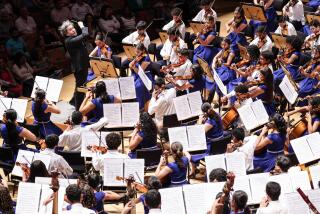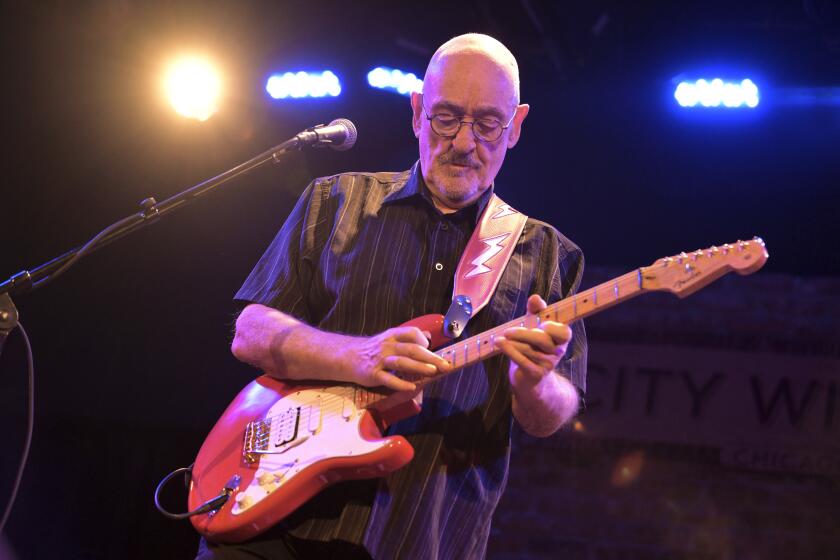Guide to the ‘Americas and Americans’ festival
Here are some things you might expect to find in a classical music festival dubbed “Americas and Americans”: This weekend’s program titled “Magic Realism.” The late Antonio Estévez’s folkloric piece “Cantata Criolla,” about a singing contest between a Venezuelan plainsman and the Devil. Leonard Bernstein’s “The Age of Anxiety” symphony paired with a work inspired by the poetry of Chilean Nobel laureate Pablo Neruda.
And here are a few things you might not: The L.A.-based, Argentine-Uruguayan alternative-electronica outfit Bajofondo. A Venezuelan actor who passed up the Gael García Bernal role in “Amores Perros.”
All these elements fit into the pan-hemispheric perspective of the first festival spearheaded by Gustavo Dudamel since he became the L.A. Philharmonic’s music director. The festival’s theme reflects the Venezuelan conductor’s belief that the barriers that traditionally have divided the hemisphere are arbitrary and false. “The important thing, for my first season . . . is to break these borders that exist, and to break them through art,” he said.
Dudamel will conduct the Phil in several concerts throughout the festival. On Thursday and Friday, he’ll lead the orchestra, pianist Jean-Yves Thibaudet and mezzo-soprano Kelley O’Connor in pieces by Bernstein, Lieberson and Carlos Chávez (“Toccata for Percussion”). On May 4, he’ll preside over a program that includes world premieres by Derek Bermel and Esteban Benzecry.
He’ll also take up the baton for four performances (April 29-May 2) of “Cantata Criolla” (1954), which also will be performed by the Los Angeles Master Chorale and the Schola Cantorum of Venezuela, the choral branch of Venezuela’s national El Sistema musical education program, under music director Maria Guinand.
In a phone interview, Guinand, a longtime friend of Dudamel’s, said that the festival will let North American audiences experience the close relationship that exists in Latin America among classical, popular and folk music. “In Latin America there is popular music of very high quality,” Guinand said. “The same with the folk traditions, they are very alive. The tango is being re-created continually, and the salsa too.”
Deborah Borda, the Phil’s president, agreed that the festival will demonstrate what she termed the “ecumenical and multicultural” nature of South American music. She pointed to another festival piece, the Argentine composer Osvaldo Golijov’s “Pasión según San Marcos,” which enfolds Brazilian, Caribbean and Jewish liturgical influences, as the “apo- theosis” of that approach.
Befitting its narrative-theatrical construction, “Cantata Criolla” will be accompanied by a film made by Alberto Arvelo, whose 2006 feature documentary “Tocar y Luchar” raised the global profile of El Sistema and the Simón Bolívar Youth Orchestra, which Dudamel conducts. There also will be spoken-word texts written by screenwriter Guillermo Arriaga (“Amores Perros,” “Babel”) and performed by actors including Helen Hunt and Édgar Ramírez, the young Venezuelan who passed on “Amores Perros” but appears on his way to Hollywood leading-man status.
“Gustavo is forming a new space for a number of Latin American composers, Chávez, Estévez, composers of a very high level,” Arvelo said in a phone interview.
Gustavo Santaolalla, the musician, composer and movie soundtrack author (“Brokeback Mountain”) who will lead Bajofondo in a May 14 concert that celebrates the 200th anniversary of former Spanish colonies’ wars of independence, summed up the festival’s leitmotif succinctly. “When I grew up in Argentina,” he observed, “they taught me that America was a continent, not a country.”
More to Read
The biggest entertainment stories
Get our big stories about Hollywood, film, television, music, arts, culture and more right in your inbox as soon as they publish.
You may occasionally receive promotional content from the Los Angeles Times.











